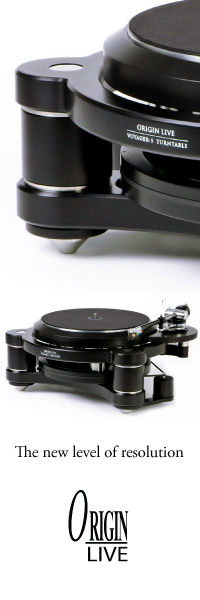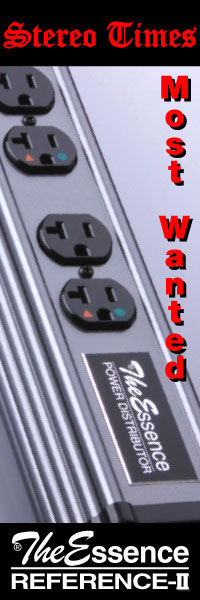Synchrony Cables from GutWire®
| Synchrony Cables from GutWire® |
|
Good Sound and Quality Craftsmanship at a Moderate Price |
|
Rick Siegert |
|
27 April 2002 |
 Specifications
Specifications
high purity oxygen-free copper
Unique wire-weave patterns
Sophisticated shielding for RFI and EMI rejection
Price:
Synchrony Interconnects: 1 meter pair – $399.00
With XLR or RCA locking connectors.
Synchrony Speaker Cables: 8 foot pair – $1,150.00
With WBT spade connectors
Address:
GutWire Audio Cables
9019 Bayview Ave.
Suite 2B-183
Richmond Hill, ON
Canada L4B 3M6
Phone: 416-930-3118
Website: www.gutwire.com/
Contact: gutwire@gutwire.com
GutWire: Named After the Best String for Tennis Rackets!
Think about it for a moment. No matter how good a tennis racket is, it can’t do anything without strings. The better the quality of the string used, the better that the racket will perform, and gut is the highest quality tennis racket string available. This is GutWire’s view of the audio realm as well. Good stereo “strings” are needed to make the system perform up to its potential. The Synchrony series is GutWire’s middle product lineup, fitting between their more affordable Basic series and their statement line of products, the Chimes. I auditioned both the Synchrony interconnects and loudspeaker cables together as a system as suggested by Herbert Wong, one of the principals at GutWire.
Taking them out of the box when they first arrived, I was immediately impressed by the obvious quality of construction. Every GutWire cable is hand crafted. These interconnects are slender, approximately 0.009525 meters (about ⅜ inches) in diameter, and are very flexible. These cables can be used in most pieces of Audio or Audio/Video furniture without a problem. I reviewed the RCA terminated cables, which have very nice locking RCA connectors.
The Synchrony Loudspeaker Cables are an excellent compliment to the interconnects as they are covered with the same shielding. The two distinct runs of cable within the cover give them an overall oval shape. At their widest they are about 0.015875 meters (about ¾ inches), are very flexible and terminated with very nice WBT 0680 spade connectors. If you find that you need cables that bend easily and fit in tight spaces, definitely look at GutWire Synchronies.
The Sound of GutWire
As always, I burned the cables in for about a week before beginning serious auditioning.
Cables can look really good, but the ultimate test is how they perform over a wide range of music, and I use a mixture of classical and rock music in my auditioning. One of my favorites is the DCC re-master of Bonnie Raitt’s Luck of the Draw [DCC GZS-1107]. It is by turns upbeat, serious, and always fun. The DCC version has an excellent soundstage and focused instrumental placement, as well as great details, vocals and subtlety. Using this as my first audition disk, I found the bass to be good and firm and the tonal range to be well balanced. No frequency called attention to itself, and none was recessed. The tone as a whole was slightly dark, lacking the final bit of treble extension. The soundstage was good, giving a convincing image well behind the physical placement of my speakers. As the vocals were recreated behind the plane of the speakers, it gave the impression of my being in the middle of the auditorium. The sibilance of the vocals was convincing, as was the shimmer of the brush on a cymbal. In my system the cables were polite; closer to the “New England” concert hall sound than the “California” front-row, rock concert sound. My system is in the middle of the two, and the cables worked well for me. If you have a system that is very up-front or has too much treble energy, these cables might be a wonderful match.
The next CD that I used was Sarah Chang’s remarkable Debut album, [EMI Classics 54352]. Her virtuosity with a one-quarter sized violin is miraculous. This album, with only a violin and piano accompanist, is a good test for subtlety, details and dynamics. Once again, the GutWires gave a good result. The violin was full-bodied, allowing me to hear the resonance of the wooden body. The Piano also resonated properly. Neither the soundstage nor the placement of the instruments within it are very good on this album recording, so I won’t comment on those.
Holst’s The Planets, recorded by Charles Dutoit and the Montreal Symphony (EMI London 417 553-2), is not only an excellent recording of The Planets, but is also a very good recording for testing bass and how an audio system handles congestion. On the fourth track, “Jupiter,” at about 1:10, the music rises to a crescendo. When I’m auditioning, I try to follow the individual voices of instruments like the bass, the triangle and the flute, for example. If I can hear them clearly through most of the movement, then the audio equipment is resolving the separate musical lines successfully. If not, then it has a problem with congestion. The Synchrony cables were able to resolve the different individual instruments in a very satisfactory manner.
Eric Clapton’s Unplugged [Reprise 9 45024-2] is another of my auditioning favorites. When the system is working well, I get a sense of actually being at the concert. The Synchrony cables gave me that feeling. The soundstage and focus was very good, and I could locate the distinct performers and instruments easily. The album sounded very realistic; however I did notice a very slight blurring in the midrange. This was the first time I noticed this blurring, and it may be related to resonances at the time of recording, and not an artifact of playback!
All in all, I enjoyed my time with GutWire’s Synchrony cables. It brings many of the benefits of their top performing Chime series to the market at a more modest price point. More modest is a relative concept, of course, but many more audiophiles can afford these cables than the Chime cables.
![]()
Don’t forget to bookmark us! (CTRL-SHFT-D)
Stereo Times Masthead
Publisher/Founder
Clement Perry
Editor
Dave Thomas
Senior Editors
Frank Alles, Mike Girardi, Russell Lichter, Terry London, Moreno Mitchell, Paul Szabady, Bill Wells, Mike Wright, and Stephen Yan,
Current Contributors
David Abramson, Tim Barrall, Dave Allison, Ron Cook, Lewis Dardick, John Hoffman, Dan Secula, Don Shaulis, Greg Simmons, Eric Teh, Greg Voth, Richard Willie, Ed Van Winkle, Rob Dockery, Richard Doron, and Daveed Turek
Site Management Clement Perry
Ad Designer: Martin Perry





Be the first to comment on: Synchrony Cables from GutWire®